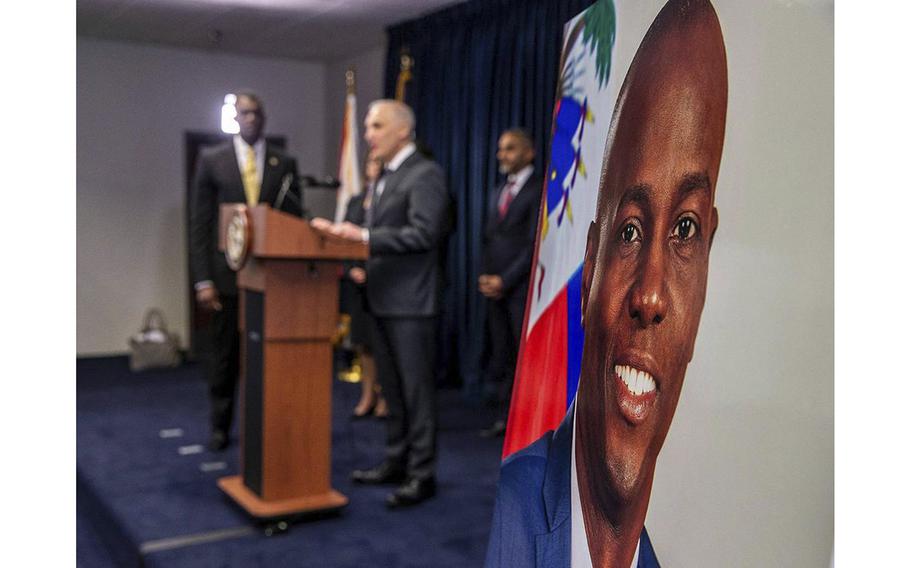
An image of former Haitian President Jovenel Moise is seen in the foreground as U.S. law enforcement officials in Miami on Feb. 14, 2023, announce developments in the prosecution of individuals allegedly connected to the Moise’s assassination. (Pedro Portal/Miami Herald/TNS)
MIAMI (Tribune News Service) — A Miami federal judge has issued a gag order in the assassination case of Haitian President Jovenel Moïse, barring defense attorneys from disclosing any evidence to outside parties based on "safety concerns" about witnesses involved in the high-profile case as well as law enforcement personnel, U.S. citizens stationed abroad and their relatives.
The protective order bars defense attorneys from sharing "restricted material" with anyone other than their clients, their legal staff and their experts. In particular, the order prohibits them from sharing evidence with "any foreign non-U.S. attorneys or foreign individuals," including relatives of the defendants or their lawyers abroad.
The order could pose challenges for an ongoing assassination investigation in Haiti, where an investigative judge is still trying to determine who killed the president and why.
The 11 defendants charged in the assassination conspiracy case are mostly from Haiti and Colombia, with a few from South Florida. A trial date is set for May 8 in Miami federal court, though one defendant, convicted Haitian drug trafficker Rodolfe Jaar, has indicated he plans to cut a plea deal, court records show. His lawyer could not be immediately reached for comment.
The protective order, granted Wednesday by U.S. District Judge Jose Martinez, was sought by prosecutors with the U.S. Attorney's Office in a joint request with the defense attorneys representing the defendants. An indictment accuses the defendants of either conspiring to kidnap and kill Haiti's president or smuggling bulletproof vests to a Colombian mercenary group that murdered Moïse in his home on July 7, 2021. The murder conspiracy charges carry up to life in prison and the smuggling offenses up to five years.
So far, the judge has signed off on protective orders involving eight of the 11 defense attorneys involved in the highly sensitive case, court records show. Prosecutors approached each defense attorney about the gag order on an individual basis.
In federal court, protective orders are commonplace in cases involving national security, violent crimes and drug trafficking. But the order in the Haiti assassination case is more restrictive than usual because it requires defense attorneys to return or destroy witnesses' statements shared by federal prosecutors at the end of trial or any appeals.
"They sought the protective order to protect the physical integrity of their witnesses," said Henry Bell, a Miami attorney for one of the 11 defendants and who is also a representative for a group of 175 private attorneys regularly assigned to criminal cases involving people who can't afford to pay for legal representation.
"The bottom line is, they don't want to have to explain why something happened to a witness who testified in this case," Bell said.
Kenneth Swartz, a Miami attorney representing another defendant in the Haiti assassination case, agreed with his colleague.
"Protective orders restricting evidence have become all too common in our world of instant internet dissemination through social media," Swartz said. "It's one way of preventing the information about a witness from falling into the hands of someone with bad intent."
The U.S. Attorney's Office in Miami declined to comment.
The protective order applies to lead defendant Antonio "Tony" Intriago, the owner of a Miami-area security firm, Counter Terrorist Unit Security, and the other defendants implicated in the plot to kill Haiti's president.
Intriago was arrested last month in South Florida along with three other defendants, including Arcángel Pretel Ortiz, operator of the affiliate CTU Federal Academy LLC, and Walter Veintemilla, head of Miramar-based Worldwide Capital Lending Group. All three have been charged with supporting a conspiracy to kidnap and kill the president of Haiti.
Another defendant, Frederick Bergmann Jr., was also arrested last month and released on bail. He is charged with conspiring to smuggle ballistic vests to former Colombian soldiers who allegedly carried out the fatal shooting of Moïse and seriously wounded the president's wife, Martine Moïse. He's also charged with failing to file valid export paperwork in connection with 20 bulletproof vests that were smuggled into Haiti prior to the assassination. The vests were shipped on June 10, 2021, from Miami to Port-au-Prince and marked as "medical X-ray vests and school supplies."
The men were arrested two weeks after the U.S. government brought four other defendants to South Florida from Port-au-Prince, where they had been imprisoned but not yet charged.
In late January, Investigative Judge Walther Wesser Voltaire in Haiti reluctantly agreed to allow the United States to transfer the group of Haitian-American and Colombian suspects from Port-au-Prince to Miami to face federal conspiracy charges in connection with the assassination. According to a source familiar with the Haitian investigation, Voltaire did so hoping he would also have access to the defendants or any new ones to help him in his ongoing probe.
But, because of the new protective order, that may not happen.
The order is the latest development in the case, which has been partly shrouded in secrecy. Last year, Miami federal prosecutors asked a judge to protect classified evidence in the case to seal off sensitive information — presumably about some of the defendants' past activities. When authorities arrested Ortiz last month, they acknowledged that he had been an FBI informant at the time of the assassination. The Miami Herald was the first to report the identity of the informant and his connection to the FBI.
©2023 Miami Herald.
Visit miamiherald.com.
Distributed by Tribune Content Agency, LLC.